
NC3, the group suing the city of Encinitas. (Photo: Facebook)
Residents In North San Diego County Slap Encinitas With Lawsuit On Homeless Program
The $256,369 HEAP Grant would provide only $12,208 for the homeless, with the remaining going to operating costs and salaries
By Michelle Mears, March 11, 2020 11:20 am
Members of the NC3 believe that it is an irresponsible use of tax payer funds to spend over a $1 million on a safe parking lot for less than ten vehicles.
A lawsuit was filed this month against the city of Encinitas in North San Diego County against a safe parking lot program for the homeless who sleep in their vehicles. A group called the North County Citizens Coalition filed the complaint on March 2. The coalition, also referred to as NC3, is a California company with its operations in Encinitas, California. It is composed of private citizens who have come together to ensure elected officials are working for those they represent.
The safe parking lot program was the catalyst that thrust residents into conducting their own investigations and grass-roots advocacy to uncover transparency issues between the city and non-profit organizations.
One of the non-profits in question with NC3 is Jewish Family Services who approached the City of Encinitas on October 4 with an application for a project to develop a portion of the Leichtag property as a residential “safe parking lot” for “qualified” homeless individuals to stay overnight.
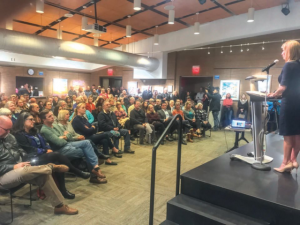
The Leichtag Foundation owns a 67-acre property in Encinitas at what was formerly known as the Paul Ecke Ranch. The property is zoned agricultural in perpetuity dating back to December 14, 1994.
Lawsuit Claims Safe Parking Lot Program Is A Zoning Violation
The lawsuit claims the safe parking lot location is a zoning violation, “Because such a residential use is not allowed on agricultural property, the city of Encinitas used a previously declared shelter crisis to make JFS eligible for Homeless Emergency Aid Program (“HEAP”) funds to operate the parking lot project.“
Assembly Bill 143 states, “Upon declaration of a shelter crisis, existing law, among other things, suspends certain state and local laws, regulations, and ordinances to the extent that strict compliance would prevent, hinder, or delay the mitigation of the effects of the shelter crisis.“
The claimants believe this law sets a dangerous precedent and residents should maintain local control. In the lawsuit they accuse the city of creating a fake crisis to circumvent the city’s zoning laws: on October 17, 2018 they passed a resolution for the sole purpose of facilitating HEAP-funded projects, to evade CEQA, the Coastal Commission and the zoning.
A public meeting held January 14 at the Encinitas Senior Center showed the $256,369 HEAP Grant would provide only $12,208 for the homeless. The remaining monies would fund operating costs and salaries.
San Diego Supervisor Kristin Gaspar who took part in the Jan. 14 meeting said, “Encinitas city officials used the 2017 Point in Time count resolution to declare a crisis. Declaring a shelter crisis allows the city to get around the zoning laws, sidestep voter approval and skip environmental reviews.“
Gaspar also informed city residents the HEAP Grant has stipulations that allow people from outside the city to utilize the parking lot. The residents would prefer to use public donations of non-HEAP funding to help only the homeless residents of Encinitas.
The Mayor of Encinitas, Catherine Blakespear, said during a city council meeting, “People are not homeless because we are inviting them here. This is one of the biggest misconceptions, that we are creating a magnet for people to use 25 parking spots. Those parking spaces will be filled and it will be all Encinitas residents.“
Members of NC3 have been doing their own investigations, and cite on average only six to seven people a night are currently using the safe parking lot. A few residents reported to the California Globe they are able to see into the parking lot from their homes, they are documenting this, and will submit their findings to when the lot use is up for renew in May.
Using the state shelter crisis law, the city thwarted its police powers under AB 143 when JFS came to them with the grant from HEAP. The city moved forward without needing approval from residents to lease the agricultural zoned land for $1 and allow up to 25 homeless people to park their vehicles in a parking lot on the ranch that sits in the middle of residential neighborhoods.
Morris said, “We have to thank Kristin Gaspar for helping us when nobody else would. She pulled in our biggest crowd to date, allowed us to get our message out and all we want to do is preserve and protect this town. You wouldn’t think it would be such a freaking nightmare.“
The homeless issue is playing a role in this years elections. Crista Curtis, a member of NC3 wrote, “Gaspar will be on the ballot in November and she is the only supervisor candidate that supported our effort to stop the homeless parking lot hub for North County. She brings proven solutions for homelessness not sleeping in cars. We need to work hard to get her re-elected in November.”
Law Suit Claims City Officials Violated The Brown Act
The city is also accused in the lawsuit of violating the Brown Act. Elected officials failed to post any agenda related to strategies allowing residential use on an agricultural property. The claim states, “During the November 20 city council hearing, it became clear that such discussions did take place between Leichtag, Jewish Family Services and the city prior to that hearing.”
On January 16, 2019 the city was given notice of the Brown Act violation with an opportunity to resolve the issue within 30-days. NC3‘s lawsuit states, “The City is deemed to have made a decision not to cure the violation, as such petitioner requests that the court declare that the resolution approving the safe parking lot project was unlawful and issue an injunction invalidating the approval.“
Proponents at the public meetings for the parking lot called the residents in opposition “heartless” and “lacking compassion.” The opponents said they want to help the people sleeping in cars but don’t agree with the location being in an agricultural zone in the middle of a residential community. In addition, opponents said they don’t want to use HEAP funds, which tie the city’s hands and allows non-city residents to use the parking lot, which invites homeless from all over to move into their community, thus increasing their homeless population.
On February 7, the California Department of Housing and Community Development sent a letter to the City of Encinitas making the following claims:
a. The City has failed to provide required low-income housing (opposed to a parking lot); and
b. The safe parking lot project unlawfully discriminates against chronically homeless people, disabled people and mentally ill people.
Lack of Transparency Between City Officials and Non-Profits
Members of NC3 also are upset with the lack of transparency among the players who are pushing for the safe parking lot, zoning changes and HEAP grants. At the Jan. 22 city council meeting where the city officially approved the homeless program the room was overflowing with people wanting to speak out and offer their opinion. Jeff Morris, the founding member of NC3, was very vocal that only Encinitas residents opinions should be heard. What he discovered was the city council room was filled with what he calls “props.”
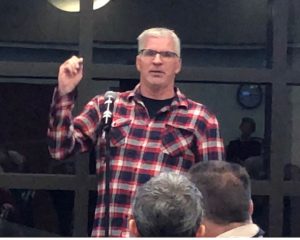
“It’s all staged, fake, these people knew what they were doing,” said Morris. “This type of divisive attitude needs to stop and stop now. We have a train wreck that started in November because somebody planned for years how to takeover this town. Some of us don’t care about their plans especially when it comes to using homeless people.”
“The CEO of JFS, Michael Hopkins sits on the board of the Regional Homeless Task Force. He approved the grant to his own agency,” said Curtis. “JFS is funding large salaries with these grants where only a small portion actually go to serve the homeless. It is a fraud.”
According to the Jewish Family Services tax returns, Hopkins made $306,244 in 2017 as CEO of JFS and the three people under him, made a combined $438,600.
In another document provided by Curtis, JFS is distributing only $5k in cash assistance with the $256,359 from the HEAP grant.
JFS also wrote in an informational document sent to the public, “HEAP funding is available until May 31, 2021.” The program can extended up to an additional four times.
Members of the NC3 believe that it is an irresponsible use of tax payer funds to spend over a $1-million on a safe parking lot for less than ten vehicles.
Encinitas residents are documenting every day what they see around town by utilizing a city operated online site that allows residents to report with photos what they observe around town. Stew Duncan, a resident of Encinitas wrote, “If you want a great tool to report homeless trash or camps, and to see other reports to the city regarding trash, graffiti, homeless camps check out the city’s app. It’s a good idea to take a picture of what you’re seeing (needles, human waste, etc.) and post immediately, as it helps us document and share. Here is the link.
Follow the California Globe for the next article that will delve into the non-profits and alleged fake residents who are accused of stacking a city council meeting in favor of the safe parking lot. Members of NC3 believe the alleged “props“ are creating a fake narrative on what city residents truly want for their community.
“They are dividing the city and caused more damage so a few can abuse emergency shelter laws to rezone the property,” said Morris.
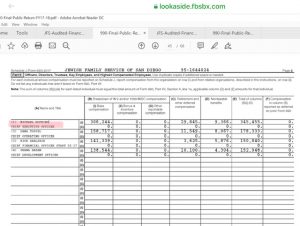
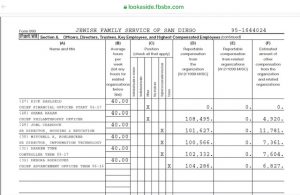


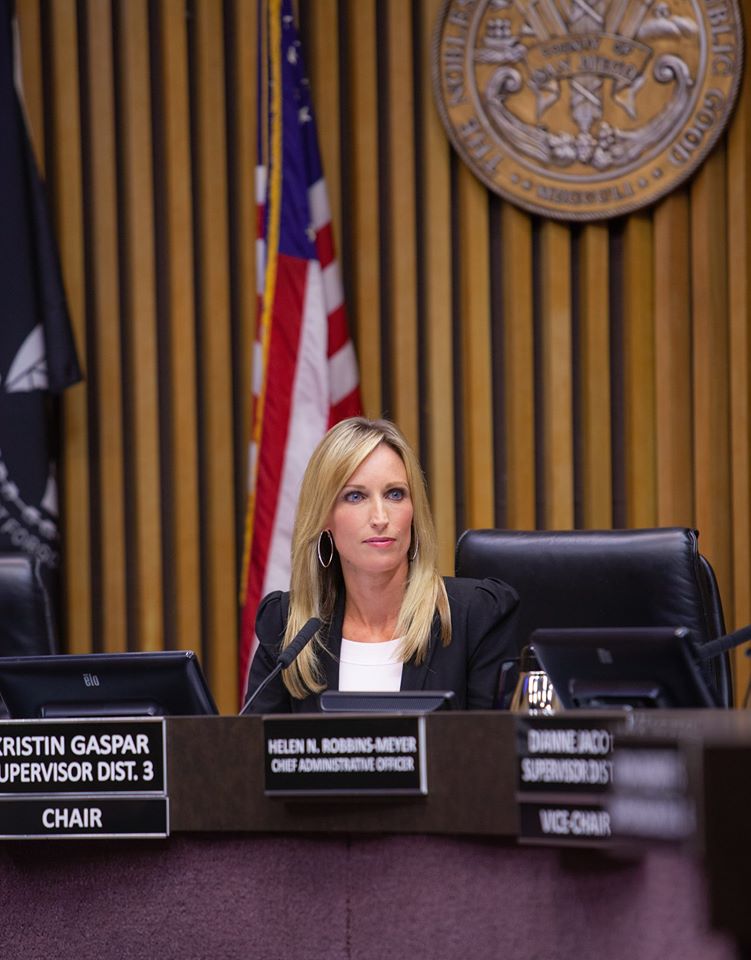
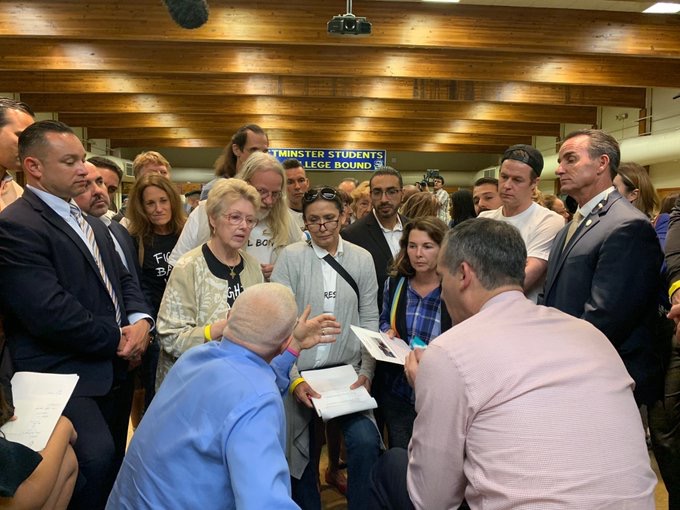
Thank you, residents of Encinitas, for standing up for your city! And, for showing the fraud that is rampant in “helping the homeless” while enriching those who are tasked to help. Just like the Red Cross, the CEOs and those under them, are being paid obscene amounts. These “charities” are rolling in dough, just not using it as they should.